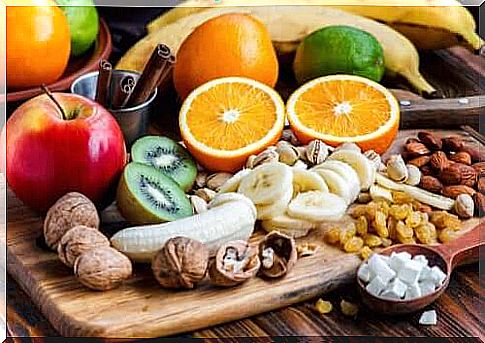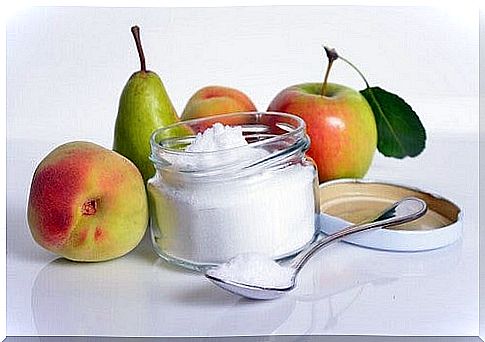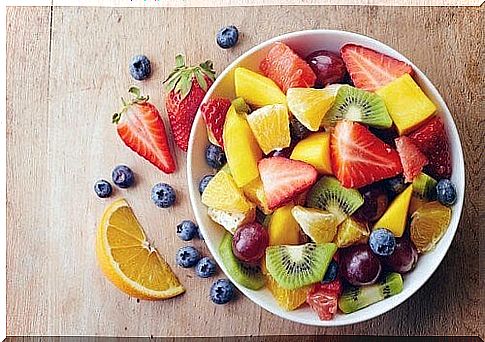Are Fruit Sugars Bad For You?

From a chemical composition point of view, the sugars in fruit and those contained in sweets are the same thing ; however, the effects they have on overall health are completely different. Furthermore, it is a fact that most of us should consume more fresh fruit. Below, we explain why.
The body processes natural fruit sugars in a different way, because the fibers in the fruit cushion the impact of glucose in the blood. When experts argue the importance of limiting sugar consumption, they refer to added sugars (pastries, sweets, cereals, fruit juices, tomato sauce, soft drinks, etc.).
In order to talk about sugars starting from a scientific basis, it is essential to refer to the Information note about intake of sugar recommended in the WHO guideline for adults and children , published in 2015 by the World Health Organization (WHO). In this document, the WHO makes a clear distinction between two types of sugars: natural sugars – which are found naturally in fruit and vegetables – and added sugars.
The latter are associated with a greater risk of onset of caries and chronic diseases and, therefore, the advice is to avoid sugar consumption exceeding 10% of our caloric needs. However, the WHO makes it clear that these recommendations do not apply to natural sugars.
Added sugars VS natural sugars
There are many foods that naturally contain sugars or that are a source of nutrients which, once assimilated, are transformed into sugars for the body. Thus, fruit is a source of fructose, milk and derivatives are a source of lactose, vegetables can contain fructose in variable percentages and also carbohydrates which, following the digestion process, are transformed into glucose, so that the body can use them.

Having said that, it is important to know that most foods – with the exception of meat – contain sugars by nature. On the other hand, there is an infinite variety of industrial foods or products to which sugar is added during the refinement process. This is to accentuate the flavors, to increase the calorie intake or to add other properties to the final result.
Cookies, some snacks and candies contain sugar, as they are industrially processed food products. The addition of this substance enhances the flavor of foods and can cause some addiction, according to an article published in the British Journal of Sports Medicine .
What are the effects of fruit sugars on the body?
When we talk about simple sugars, such as glucose, fructose or the like, we must remember that in their isolated form they have equal effects on the body, since they represent the energy substrate par excellence for the body. But sugars as such do not always occur in isolated form, but in combination with other nutrients, as a component of a food.
Therefore, the main difference lies in the process that gives rise to glucose in the body, which largely depends on the other components of the food or product in question. Thus, a drink contains neither fiber, nor vitamins or minerals important for the body and, since it is a liquid, it is easily digestible, so its sugars also enter the blood easily.
A vegetable, on the other hand, offers healthy micronutrients, fiber and a percentage of complex carbohydrates that will take longer to digest and enter the bloodstream. Consequently, this natural food which, moreover, also contains sugars has a greater satiating power, is more nutritious and does not have a high glycemic index.
All the health benefits of fruit
Fruit is useful for taking care of the body, contributes to intestinal activation and mobility, is easily digestible, very rich in water and fiber, does not contain dense starches or fats and is digested in about 20 minutes.

On top of that, fruit can help keep your weight under control. A study published in 2016 and conducted by Harvard researchers suggests that antioxidant flavonoids in fruit could have a positive effect on metabolism.
Fruit sugars and flavonoids
People who eat a diet rich in flavonoids are more likely to maintain a healthy weight with age than people who do not consume foods rich in flavonoids. Among these, the fruit that was shown to offer the most important benefits were apples, blackberries and pears.
Another positive aspect of fruit is that its soluble fiber stimulates selective proliferation in the microbiota, and this has health effects, as it improves food metabolism and reduces the risk of incurring obesity problems.
Fruit is a fundamental food
Fruit sugars are not bad for our health. Rather, worry about reducing your consumption of processed foods. And remember that jam is not fruit, just as fruit juice is not and, of course, neither are canned fruit or canned peaches.









